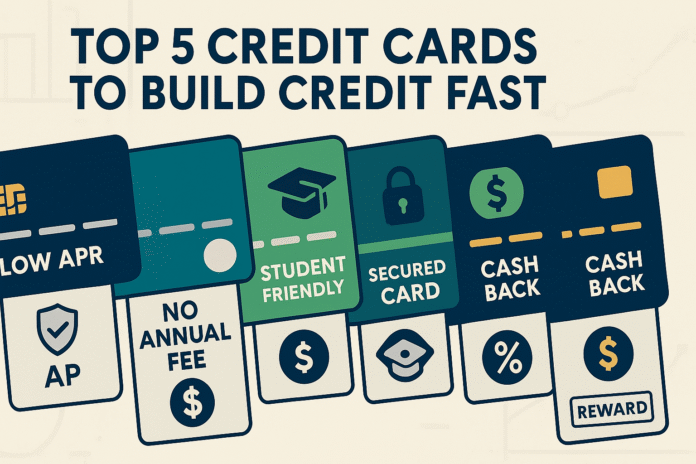A good credit history is important for getting good financial opportunities, like getting a good mortgage rate or a job that requires a credit check. Choosing the right starter credit card can make a big difference for young adults, students, and people who want to rebuild their credit. When used wisely, credit cards can help you build and improve your credit score over time. At first, they can be scary, especially if you’re worried about things like “won’t a credit card get me into debt?” or false beliefs that not having a credit history will keep you from getting approved. In fact, a lot of issuers make products just for beginners or people who are trying to rebuild their credit. These products often have low or no annual fees, easy approval processes, and benefits that help you build good financial habits.
In this article, we’ll go into great detail about the 5 Best Credit Cards for Building Credit in 2025. We’ve looked closely at and compared different options that meet different needs, such as secured cards that need a refundable deposit and unsecured starter cards that use other data to get approved. Our suggestions take into account important factors like low fees, credit reporting to all three bureaus, cashback rewards, and tools to help people use their cards responsibly. These cards are a safe and educational way to move forward, whether you’re just starting to build credit or trying to fix mistakes you’ve made in the past.
We’ll go over each card in detail, looking at things like APR, annual fees, credit limits, and special benefits that can help you get started on the right foot. Real-life situations and small user profiles show how each card can help you in your own way. Scroll down to find out which starter credit cards are the best for helping you build credit safely and confidently. Let’s look at our top picks and see how you can use these great tools to build your credit.
The 5 Best Credit Cards to Help You Build Your Credit
Below, we’ll go into more detail about our top five picks, which are all made to fit different needs and budgets. Read on for a full look at each product, including its main features, pros and cons, mini user scenarios, and a summary box for quick reference.
1. Discover it® Secured Credit Card
The secured card from Discover is a great option for people who are just starting out or trying to rebuild their credit. If you are a student, a young adult, or someone who has had trouble with credit in the past, this card is great for you. It helps you build credit and rewards you for spending responsibly.
Important Features:
- APR: The variable APR is usually between 22.99% and 28.99%, which is normal for secured cards.
- Fee for the year: $0
- Security Deposit: The minimum deposit is $200, and if you have a good payment history, you can get it back.
- Rewards: You can get 2% cash back on up to $1,000 in combined purchases every three months at restaurants and gas stations, and 1% back on all other purchases.
- Credit Reporting: Sends reports to all three major credit bureaus to help you build your credit history.
- Special Benefits: You get free FICO® credit score monitoring, automatic reviews when you switch to an unsecured account, and a useful mobile app that keeps track of your spending and payment history.
Good things:
- There is no annual fee, so you won’t be charged extra for using the card responsibly.
- The rewards program encourages you to spend money every day while building credit.
- Regular updates on your credit score and access to educational materials help you understand how healthy your credit is.
- The chance to move up to an unsecured card after showing that you can make payments on time.
Drawbacks:
- If you don’t have a lot of money, the required security deposit might be a problem.
- You shouldn’t carry a balance because the variable APR is pretty high.
Why It’s Good for Your Credit:
You can quickly build credit with the Discover it® Secured Credit Card by spending carefully and consistently. Because it reports to all three major credit bureaus, every payment you make on time helps you. The card’s great rewards program and free credit score tracking make it easier for people who are new to credit to understand how it works. Plus, you can look forward to more financial freedom as your credit profile gets stronger because you have a clear way to upgrade to an unsecured card.
Mini User Scenario:
Think about how it would be if you were a college student with a short credit history. You put $300 down to open this card, and as you use it wisely for everyday things like groceries, eating out, and school books, your credit score starts to go up. The free FICO® monitoring tool lets you see how you’re doing month by month, and the rewards give you a small but motivating cashback bonus on everyday purchases.
Summary Box: Discover it® Secured Credit Card
- Fee for the year: $0
- Minimum security deposit: $200
- APR: 22.99% to 28.99% variable
- Rewards: 1% back on some categories and 2% back on others
- Reporting to credit bureaus: Yes (all major ones)
- Extra Benefits: Get a free FICO® score and the chance to upgrade to an unsecured option
2. The Capital One Platinum Secured Credit Card
The Capital One Platinum Secured Credit Card is a great choice for people who want to build or rebuild their credit without paying a lot of money each year. It works best for people who don’t have perfect credit or a long credit history. It has special features that help you get a higher credit limit over time.
Important Features:
- APR: The APR can change, but it usually stays between 26.99% and 29.99%.
- Fee for the year: $0
- Security Deposit: You can choose from options starting at $49, $99, or $200, depending on how good your credit is.
- Credit Limit: Depending on how well your account does, it may be higher than your deposit.
- Credit Reporting: Sends reports to all three major credit bureaus.
- Special Benefits: You can use credit monitoring tools, manage your account online, and even get an unsecured card if you use it responsibly.
Pros:
- Easy to get into with security deposits that can be changed.
- No yearly fee and a mobile app that is easy to use.
- Chance to raise your credit limit without having to make another deposit.
- You can easily switch to an unsecured card if you show that you are responsible with your credit.
Disadvantages:
- Higher APR than some cards that don’t require a deposit.
- It doesn’t give out as many rewards as other cards that do, so it’s better for building credit than getting cash back.
Why It’s Good for Your Credit:
This card is great for people who want to start small but also want to be able to grow. The fact that you can change the amount of your security deposit means that you can still qualify and work your way up to a higher credit limit even if you don’t have a lot of money. This secured card is a great way to build a good credit history because it reports your on-time payments to the credit bureaus on a regular basis. Its management tools help you keep track of your spending and budget, making sure you stay on top of your payments and credit use.
A small user scenario:
Think about Jordan, who just had a problem with his credit score. He chooses the Capital One Platinum Secured Credit Card because he can start with a $99 deposit instead of a bigger one. Jordan is responsible with his credit because he uses the card for everyday purchases and pays off his balance every month. He soon gets an increase in his credit limit and eventually gets an unsecured card, which is a big step forward in his financial journey.
Summary Box: The Capital One Platinum Secured Credit Card
- Fee for the year: $0
- Security Deposit: $49, $99, or $200 at the start
- APR: 26.99% to 29.99% variable
- Reporting to credit bureaus: Yes (all major ones)
- Special Benefits: You might be able to get a higher credit limit or switch to an unsecured card.
3. Petal® 1 Visa® Credit Card with No Annual Fee
The Petal® 1 “No Annual Fee” Visa® Credit Card is made for people who don’t have a lot of credit history. It uses different ways of underwriting that go beyond the usual FICO score, which makes it easier for beginners to use. This card is great for students, young adults, or anyone who wants to build credit without having to put down a security deposit.
Important Features:
- APR: The variable APR usually falls between 20% and 26%, depending on how good your credit is.
- Fee for the year: $0
- No security deposit is needed.
- Credit Limit: It depends on your spending habits and financial situation.
- Reporting to Credit Bureaus: Reports to all three major credit bureaus.
- Rewards and perks: It may not be the best cashback site, but it does have a simple, easy-to-use interface and tools to help you keep track of your spending and credit habits.
- Special Perks: Petal’s easy-to-use mobile app lets you keep an eye on your credit and manage your money, so you can see how your spending affects your credit score.
Good things:
- No security deposit needed makes it easier for more people to get.
- No yearly fee makes it easier to build credit without spending a lot of money.
- Different criteria for approval mean that even people with little credit history can get approved.
- The app is easy to use and helps you keep track of your spending and budget.
Disadvantages:
- Compared to other cards that focus on cash back, the rewards program is small.
- If you have a balance, the APR can be high, so it’s important to pay off the full statement balance every month.
Why It’s Great for Improving Your Credit:
Petal® 1 is great for people who are new to credit and may not be able to get regular cards because they don’t have a credit history. It’s an unsecured card that looks at your whole financial picture when deciding whether or not to approve you. This includes your banking history and how you handle your money now. People who haven’t yet built a traditional credit file will find this to be a great option. You can quickly build a strong credit profile with responsible use, and Petal’s innovative financial management tools make the process easy.
Mini User Scenario:
Think about what it would be like to start your first part-time job after graduating from high school. You don’t have a credit history, so you’re worried that you won’t be able to get a credit card. The Petal® 1 card is here to help. You don’t have to pay a security deposit or an annual fee, and you get approved based on your banking data. You start to see your credit score go up as you use the card for everyday purchases and pay off the balance each month. This opens up new financial opportunities in the future.
Summary Box: Petal® 1 Visa® Credit Card with No Annual Fee
- Yearly Fee: $0
- No security deposit is needed
- APR: 20% to 26% variable
- Yes, all major credit bureaus report.
- Special Benefits: Different ways to underwrite and easy-to-use tools for tracking finances
4. Chime Credit Builder Visa® Card
The Chime Credit Builder Visa® Card is a one-of-a-kind product that works with Chime’s other banking products. It is for people who want a simple and modern way to build credit without the high interest rates that come with regular credit cards. People who are good with technology and young professionals who want to manage their money easily will like this card the most.
Important Features:
- APR: Not applicable—this isn’t a revolving credit card; it’s more like a secured credit line linked to a Chime Spending Account.
- Fee for the year: $0
- Security Deposit: Instead of a regular deposit, money is taken out of your Chime Spending Account, which acts as the backing for your credit line.
- Credit Limit: This is based on how much money you put into your Credit Builder account.
- Credit Reporting: Sends reports to all three major credit bureaus.
- Rewards and Benefits: It may not offer a lot of rewards, but its main benefit is that it makes it easy and clear to build credit.
- Special Benefits: The Chime Credit Builder has real-time alerts, automatic payments, and works with the Chime app to help you keep track of your progress toward a higher credit score.
Pros:
- There are no interest charges because it isn’t a regular credit card.
- No yearly fee and a simple, digital-first experience.
- Automated features make sure you never forget to make a payment.
- Great for people who want to build credit by saving and spending wisely.
Disadvantages:
- Doesn’t give cash back or regular points as rewards.
- You need to have a Chime Spending Account to use it, which means you have to set up your bank account a little differently.
Why It’s Good for Your Credit:
If you like a modern, fee-free way to build credit, the Chime Credit Builder Visa® Card is the best choice for you. You won’t have to worry about getting into debt with high-interest charges because the card is backed by the money you put into your Chime account. It is easier to see how your daily spending affects your credit history because it works with advanced budgeting and monitoring tools. People who are serious about being financially responsible and want to avoid the usual problems that come with credit cards should consider this hands-on way to build credit.
Mini User Scenario:
Think about Mia, a young professional who likes to use an app to keep track of her money. She sets up a Chime Spending Account and sends a small amount of money to her Credit Builder card. Mia sees her credit history slowly getting better on the app every time she uses the card to buy something, and she doesn’t have to worry about interest or fees. The experience makes her more determined to spend responsibly, and her better credit score will help her make big purchases in the future.
Summary Box: Chime Credit Builder Visa® Card
- Fee for the year: $0
- Security Deposit: Move money from your Chime Spending Account
- APR: Not applicable
- Credit Reporting: Yes, all major bureaus
- Special Benefits: Payments that happen automatically and app tracking that is built in
5. Visa® Credit Card with OpenSky® Security
The OpenSky® Secured Visa® Credit Card is a great option for people with very little or bad credit. It doesn’t require a credit check, so it’s meant for people who might not be able to get other secured cards. This makes it a great way to rebuild credit while showing that you can handle your money well over time.
Important Features:
- APR: The variable APR is usually between 17% and 26%, depending on the state of the market.
- Annual Fee: $35 (not too much for the benefits it gives to building credit).
- Security Deposit: A deposit that you can get back that starts at $200 and directly sets your credit limit.
- The credit limit is the same as the amount of your security deposit.
- Credit Reporting: Reports to all three major credit bureaus, so every payment you make on time helps your credit repair.
- Rewards and benefits: It doesn’t usually offer a lot of rewards, but its main draw is that it’s easy to get—no credit check means higher chances of approval.
- Special Perks: Even if you have a bad credit history, this program gives you a way to rebuild your credit with clear rules on how to use it responsibly and keep track of your progress.
Pros:
- Doesn’t need a credit check, so people with bad or no credit can get it.
- A credit-building tool that is easy to understand.
- Reports to all the major credit bureaus to help you rebuild your credit quickly.
- The security deposit sets your limit directly, which keeps your borrowing in check.
Disadvantages:
- The $35 annual fee is more than what some cards with no fees charge.
- The rewards program is not very good; it is more about fixing credit than giving people incentives.
- The card’s design is more practical and less fancy than other options.
Why It’s Good for Getting Credit:
OpenSky® is great for people who want to start over. This is a great chance for people with very bad credit to start rebuilding their credit history because there is no credit check. The card naturally enforces responsible spending limits by requiring a security deposit that is equal to your credit limit. You show that you are financially responsible every time you make a payment on time. OpenSky® is great for people who know that building credit takes time and are willing to take small steps to get their financial credibility back.
A short user scenario:
Kevin is someone who has had trouble with credit in the past. He applies for the OpenSky® Secured Visa® Credit Card because he can’t get a more traditional card. He starts making small, regular purchases and paying them off right away with a $250 deposit. Kevin’s credit score keeps going up over time, which lets him eventually qualify for better, unsecured options. Many people who started with OpenSky® on their way to credit recovery have had similar experiences to his successful journey.
Summary Box: The OpenSky® Secured Visa® Credit Card
- Fee for the year: $35
- Minimum security deposit: $200
- APR: between 17% and 26%
- Reporting to credit bureaus: Yes (all major ones)
- Special Benefits: No credit check needed, great for fixing bad credit
Table of Comparison
The table below shows all five cards side by side, with a quick look at the main features, fees, and benefits of each one. This table will help you figure out which card is best for your financial goals and way of life.
| Card Name | Annual Fee | Security Deposit | APR Range | Rewards/Perks | Approval Requirements |
|---|---|---|---|---|---|
| Discover it® Secured Credit Card | $0 | Minimum $200 | ~22.99%–28.99% | Cashback rewards, free FICO score, upgrade option | Standard secured card criteria |
| Capital One Platinum Secured Card | $0 | $49 / $99 / $200 | ~26.99%–29.99% | Flexible deposit options, possible credit limit increase, upgrade to unsecured | Basic credit history required |
| Petal® 1 “No Annual Fee” Visa® Card | $0 | None | ~20%–26% | Easy-to-use budgeting tools, different underwriting | Little credit history needed |
| Chime Credit Builder Visa® Card | $0 | Transfer money from your spending account | Not applicable | Automated payments, built-in financial app, no interest charges | You need a Chime account |
| OpenSky® Secured Visa® Credit Card | $35 | Minimum $200 | ~17%–26% | No credit check needed, easy to build credit | Great for people with bad or damaged credit |
How to Use This Chart:
- Annual Fee and Security Deposit: Think about how much money you have to spend. If you don’t have a lot of money, a no-fee card with a low deposit or no deposit, like Petal® 1, might be the best choice.
- Things to think about when it comes to APR: If you plan to pay off your balance in full every month, the APR may not be as important. But if you have a balance, high APRs can be expensive.
- Rewards/Perks: Think about what extra features are most important to you. Do you care about getting cash back, or do you like tools for managing your budget better?
- Approval Requirements: If you don’t have a lot of credit history or have had problems with credit in the past, cards that don’t require a hard credit check (like OpenSky®) might be your best bet.
How to Pick the Best Card for You
It can be hard to choose the right credit card to build credit, but if you focus on a few important factors, it will be easier.
- Secured vs. Not Secured: Secured cards, such as Discover it®, Capital One Platinum, and OpenSky®, require a deposit that can be returned. This helps keep your credit limit in check and acts as collateral. Unsecured options, like Petal® 1, don’t require a deposit and are often available to people with little or no credit history because of alternative underwriting.
- Your Credit History: Secured cards and products made for people with bad credit are usually easier to get and more forgiving if you’re just starting out with credit or trying to fix past problems. To make sure that your responsible use is reported, look for products that report to all three major bureaus.
- Costs and Budget: Think about your finances. If you don’t have a lot of money, cards with no annual fee, like Discover it®, Petal® 1, and Chime, might be a good choice. Be careful of hidden fees and choose a card that fits your budget.
- Possible Credit Limit: Some cards, like the Capital One Platinum Secured, let you raise your credit limit without having to make another deposit as long as you use the card responsibly. This can be a great way to lower your credit utilization ratio over time.
- Goals for the Long Term: Do you want to fix your credit or start building it from scratch? When you look at cards, think about how likely they are to turn into unsecured products or give you extra benefits when your credit gets better. Your card should help you move from a basic product to more advanced financial tools as your credit score goes up.
When choosing a card, think about how often you’ll use it, how much you spend, and what features are most important to you, such as strong reporting, educational tools, or rewards. The first step toward a better financial future is to pick the card that works best for your situation.
Advice on how to make the most of your new card
Using one of the best starter cards responsibly is the most important thing you can do to build long-term credit health. To make sure your card works for you and not against you, follow these tips:
- Always Pay in Full: Paying off the balance every month will keep you from accruing interest. This habit makes your payment history stronger, which is an important part of your credit score.
- Keep your credit usage low: Try not to use more than 30% of the credit you have. If you use less credit, it means you’re not relying on it too much, which can help your score go up over time.
- Set up automatic payments: Set up automatic payments so you never miss a due date and don’t have to pay late fees. One late payment can change the course of your credit history in a big way.
- Keep an eye on your spending: Use a personal budget or mobile apps to keep track of your spending on a regular basis. This methodical approach can help you avoid spending too much and make sure that every purchase helps you reach your credit-building goals.
- Look over your credit report: Check your credit report from time to time to make sure it is correct. Taking the initiative to find mistakes or signs of fraud shows that you are serious about building a strong credit history.
- Don’t apply for more than one card: Don’t give in to the urge to get a lot of cards at once. Each application can lead to a hard inquiry, which could lower your score for a short time.
If you think of your new card as a stepping stone instead of a goal, you’ll be more likely to succeed financially in the long run. Building credit is a long-term goal, so remember that consistent, responsible behavior will get you better results over time.
In conclusion
In short, the right starter credit card can help you build or fix your credit. You can build a strong credit history with any of these cards: the Discover it® Secured or OpenSky® Secured Visa®, or the Petal® 1 or Chime Credit Builder card, which are both new and exciting options. The most important thing is to find a card that fits your financial situation and your goals, use it wisely, and remember that building credit takes time and every good choice counts.
These top starter cards show that you can build credit the right way, even if you don’t have much or good credit right now. The choices you make today will affect your future financial opportunities, such as getting better loan rates, better insurance quotes, and more financial freedom. Think about your financial goals, read through the information in this guide, and take that first step toward making credit one of your most valuable assets. One responsible swipe at a time, you can get to where you want to be financially.
Questions that are often asked (FAQ)
1. Should you get a secured or unsecured credit card to help you build credit?
If you use them responsibly, both secured and unsecured cards can help you build credit. You have to put down a refundable deposit to get a secured card. This limits your credit line but makes it easier to get approved if you have bad or no credit. Unsecured cards, like Petal® 1, don’t need a deposit and often use other types of data to decide who can get them. However, they may have stricter eligibility requirements. It depends on your credit history and current financial situation which choice is best.
2. Will applying for a credit card hurt my score?
A hard inquiry usually happens when you apply for a credit card, which can make your credit score go down a little bit for a short time. But if you space out your applications and only apply for cards that fit your credit profile, the short-term effects are small compared to the long-term benefits of building a good credit history.
3. How long does it take to get credit with a credit card?
It takes time to build credit. If you use it responsibly, like keeping low balances and paying on time, you might start to see improvements in 3 to 6 months. But it could take a year or more to make a big difference in your credit score, especially if you’re starting from scratch or have had credit problems in the past.
4. Is it possible to get a credit card if I don’t have a job?
Yes, you can get a starter credit card or a secured card even if you don’t have a regular job. This is especially true if you have other sources of income, a cosigner, or a steady bank account history. Some cards, like the Petal® 1, look at more than just your job status to get a better picture of your finances.
5. What’s the difference between fixing and building credit?
When you build credit, you usually do it by getting a credit card and using it to make purchases. This is especially true if you don’t have a lot of experience with credit. On the other hand, fixing credit means taking steps to fix a credit history that may have been hurt by missed payments, high utilization, or other problems. Both processes need you to use credit responsibly, make payments on time, and be patient. However, the strategies and card options you have may be different depending on where you are starting from.
You can pick the best card for you by knowing your options and following the best practices listed above. This will help you reach your financial goals and get on the road to financial stability. Keep in mind that every good credit decision you make helps you reach your long-term goals. These credit cards for building credit give you the tools you need to succeed, whether you’re just starting out or getting over problems from the past. Enjoy the journey, work hard, and see your financial future change—one smart swipe at a time.
Building credit is fun!





